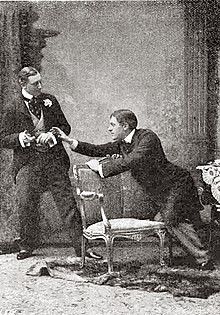| The Importance of Being Earnest | |
|---|---|
 | |
| Written by | Oscar Wilde |
| Date premiered | 14 February 1895 |
| Place premiered | St James's Theatre, London, England |
| Genre | Comedy |
| Setting | Mayfair, London, and a country house in Hertfordshire |
The Importance of Being Earnest, a Trivial Comedy for Serious People is a play by Oscar Wilde, the last of his four drawing-room plays, following Lady Windermere's Fan (1892), A Woman of No Importance (1893) and An Ideal Husband (1895). First performed on 14 February 1895 at the St James's Theatre in London, it is a farcical comedy depicting the tangled affairs of two young men about town who lead double lives to evade unwanted social obligations, both assuming the name Ernest while wooing the two young women of their affections.
The play, celebrated for its wit and repartee, parodies contemporary dramatic norms, gently satirises late Victorian manners, and introduces – in addition to the two pairs of young lovers – the formidable Lady Bracknell, the fussy governess Miss Prism and the benign and scholarly Canon Chasuble. Contemporary reviews in Britain and overseas praised the play's humour, although some critics had reservations about its lack of social messages.
The successful opening night marked the climax of Wilde's career but was followed within weeks by his downfall. The Marquess of Queensberry, whose son Lord Alfred Douglas was Wilde's lover, unsuccessfully schemed to throw a bouquet of rotten vegetables at the playwright at the end of the performance. This feud led to a series of legal trials from March to May 1895 which resulted in Wilde's conviction and imprisonment for homosexual acts. Despite the play's early success, Wilde's disgrace caused it to be closed in May after 86 performances. After his release from prison in 1897 he published the play from exile in Paris, but he wrote no more comic or dramatic works.
From the early 20th century onwards the play has been revived frequently in English-speaking countries and elsewhere. After the first production, which featured George Alexander, Allan Aynesworth and Irene Vanbrugh among others, many actors have been associated with the play, including Mabel Terry-Lewis, John Gielgud, Edith Evans, Margaret Rutherford, Martin Jarvis, Nigel Havers and Judi Dench. The role of the redoubtable Lady Bracknell has sometimes been played by men. The Importance of Being Earnest has been adapted for radio from the 1920s onwards and for television since the 1930s, filmed for the cinema on three occasions (directed by Anthony Asquith in 1952, Kurt Baker in 1992 and Oliver Parker in 2002) and turned into operas and musicals.